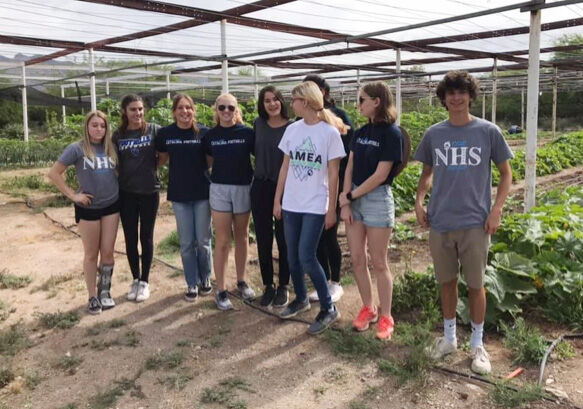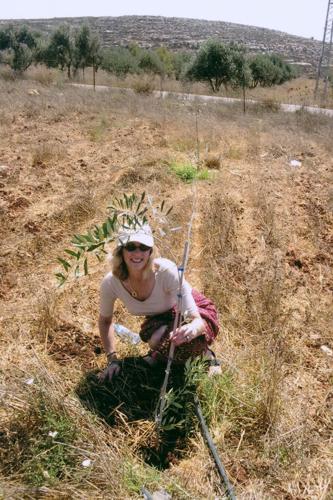Felicia’s Farm is dedicated to closing gaps in the safety net so that fewer people fall into hunger.
Although those gaps have widened for many during the pandemic, the nonprofit is working to fill them with 700 pounds of organic fruits and vegetables and up to 2,000 cage-free eggs weekly.
“We can solve this. We can fix hunger and food insecurity. Our whole idea is that people can only do the best if they have the best. Your brain works better if you have good nutrition behind you. How are people supposed to step up and make their lives better if they can’t get basic needs like healthy foods met?” said Cathy Lolwing, executive director of Felicia’s Farm.
The farm was created in 2011 to honor the memory of Felicia Ann Cutler, who had a vision to “feed the people and teach them to feed themselves.”
Her husband, David Cutler, brought that vision to fruition on 4 acres north of River Road near the Jewish Community Center. The former tree nursery is now home to the small organic farm at 3761 E. River Road; the nonprofit has also expanded to several acres nearby and will open the second location at 4141 E. River Road to volunteers this summer.
The entire project embodies the Jewish philosophy of mitzvah — performing a daily good deed — said Marv Kirchler, who has been involved with the organization since its inception and serves as president of the board of directors.
“I had the pleasure of knowing Felicia. If you were hungry, Felicia wouldn’t just bring you a sandwich; she would bring a whole loaf of bread. I have great respect for David and his family and all they are doing to help people who are underprivileged,” said Kirchler.
Family is the foundation of the project for David, who remarried several years ago to Leah Michelson Cutler, a member of the board of directors.
Kirchler said their generosity has carried the farm through the pandemic, when it became impossible to bring volunteers in to harvest and plant. He also credits a group of supportive volunteers for their dedication to the effort.
“We have some very, very committed board members that we have brought on and lots of committed people willing to do whatever we can to eliminate hunger,” he said.
All eggs and produce harvested from the farm are donated to Casa Maria Soup Kitchen, which serves 300 people daily with soup and take-home lunches, and to the Casa San Juan family resource center, which serves 5,400 low-income people monthly. Felicia’s Farm also provides food for the Pascua Yaqui tribe pantry and donates to the Lend-a-Hand program for homebound seniors and Estes Garden, a low-income senior housing facility. Additionally, flowers from the farm are gifted to local hospice programs.
“We grow seasonally, and there is no week that we don’t deliver healthy food that gives a nutritional boost to people in need. We harvested tons of onions and melons and are just coming off the end of the cabbage, and now we are growing tomatoes, squash, peppers, zucchinis and cucumbers. We try to grow culturally appropriate food. … We want people to have top quality and feel dignity and pride from having the best food so everyone knows they are valued,” said Lolwing.
Appreciation is evident among the homeless and near-homeless people who receive free soup and bag lunches from 8:30 a.m. to 11:30 a.m. daily through Casa Maria, according to Brian Flagg, who manages the kitchen.
“Felicia’s Farm is the greatest. Every week they show up and deliver produce for our soup and food bags and eggs that we hardboil and put in the lunches. People really like that healthy protein. We are big fans of Felicia’s Farm,” said Flagg.
Flagg said that Casa Maria is grateful for the support, particularly since it traditionally operates entirely on private donations. The kitchen has received milk and sandwiches from Pima County through the CARES Act during the pandemic, but Flagg is uncertain about the future.
“No one knows what is going to happen. There is a housing crisis, and the moratorium on evictions will end later this month, so that may not be good for the people on the bottom. They are afraid rents will rise and they will be out on the streets. Everyone is uncertain, and we share in that uncertainty in solidarity with those we serve,” Flagg said.
As for Felicia’s Farm, Lolwing is optimistic that operations are normalizing and that individuals and groups of volunteers will return this summer.
Kirchler hopes that people will consider taking the opportunity to get back to nature while they perform good deeds.
“This is a place people can go to get away from technology, electronic media and phones. They can dig a hole and plant seeds and see them grow. There is something about gardening and working the land that is really good for the soul,” said Kirchler, who has a background in media and whose wife owns Hem & Her Bridal.
Ultimately, Kirchler said that the farm is a reflection of simplicity and understanding that can unite people in times of uncertainty.
“Tucson is over-the-top generous. I have been here since 1985, and when there is a call out, even the people who have very little still manage to give. Even when there is a difference of thought or direction, when there is need there, the community comes together. I am very proud to be a Tucsonan,” he said.





